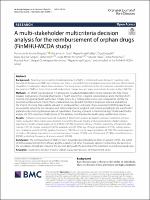| dc.contributor | Vall d'Hebron Barcelona Hospital Campus |
| dc.contributor.author | de Andrés‑Nogales, F. |
| dc.contributor.author | Cruz, Encarnación |
| dc.contributor.author | Calleja‐Hernández, Miguel Ángel |
| dc.contributor.author | Gorgas Torner, Maria Queralt |
| dc.contributor.author | Espín Balbino, Jaime |
| dc.contributor.author | Delgado-Sanchez, Olga |
| dc.date.accessioned | 2022-04-06T11:24:25Z |
| dc.date.available | 2022-04-06T11:24:25Z |
| dc.date.issued | 2021-04-26 |
| dc.identifier.citation | de Andrés-Nogales F, Cruz E, Calleja MA, Delgado O, Gorgas MQ, Espín J, et al. A multi-stakeholder multicriteria decision analysis for the reimbursement of orphan drugs (FinMHU-MCDA study). Orphanet J Rare Dis. 2021 Apr 26;16:186. |
| dc.identifier.issn | 1750-1172 |
| dc.identifier.uri | https://hdl.handle.net/11351/7317 |
| dc.description | Medicaments orfes; Reemborsament; Espanya |
| dc.description.sponsorship | This project was carried out with an unrestricted grant from AELMHU (Asociación Española de Laboratorios de Medicamentos Huérfanos y Ultrahuérfanos). AELMHU was not involved in the design of the study and collection, analysis, and interpretation of data and writing the manuscript. |
| dc.language.iso | eng |
| dc.publisher | BMC |
| dc.relation.ispartofseries | Orphanet Journal of Rare Diseases;16 |
| dc.rights | Attribution 4.0 International |
| dc.rights.uri | http://creativecommons.org/licenses/by/4.0/ |
| dc.source | Scientia |
| dc.subject | Malalties rares - Tractament |
| dc.subject | Medicaments orfes - Cost-eficàcia |
| dc.subject.mesh | Rare Diseases |
| dc.subject.mesh | /drug therapy |
| dc.subject.mesh | Orphan Drug Production |
| dc.subject.mesh | Decision Making |
| dc.title | A multi-stakeholder multicriteria decision analysis for the reimbursement of orphan drugs (FinMHU-MCDA study) |
| dc.type | info:eu-repo/semantics/article |
| dc.identifier.doi | 10.1186/s13023-021-01809-1 |
| dc.subject.decs | enfermedades raras |
| dc.subject.decs | /farmacoterapia |
| dc.subject.decs | producción de medicamentos huérfanos |
| dc.subject.decs | toma de decisión |
| dc.relation.publishversion | https://doi.org/10.1186/s13023-021-01809-1 |
| dc.type.version | info:eu-repo/semantics/publishedVersion |
| dc.audience | Professionals |
| dc.contributor.organismes | Institut Català de la Salut |
| dc.contributor.authoraffiliation | [de Andrés-Nogales F] Pharmacoeconomics & Outcomes Research Iberia (PORIB), 28224 Pozuelo de Alarcón, Spain. [Cruz E] Asociación Española de Medicamentos Biosimilares, Madrid, Spain. [Calleja MA] Servicio de Farmacia, Hospital Universitario Virgen Macarena, Sevilla, Spain. [Delgado O] Servicio de Farmacia, Hospital Universitario Son Espases, Palma de Mallorca, Spain. [Gorgas MQ] Servei de Farmàcia, Vall d’Hebron Hospital Universitari, Barcelona, Spain. [Espín J] Escuela Andaluza de Salud Pública, Granada, Spain. Instituto de Investigación Biosanitaria (IBS), Granada, Spain. CIBER de Epidemiología Y Salud Pública (CIBERESP), Madrid, Spain |
| dc.identifier.pmid | 33902672 |
| dc.identifier.wos | 000644645600001 |
| dc.rights.accessrights | info:eu-repo/semantics/openAccess |

